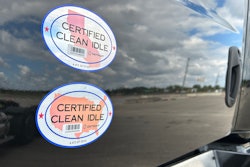Trucking news and briefs for Friday, April 11, 2025:
Former fleet owner gets prison time for lying to FMCSA
A former New York-based trucking business owner was sentenced March 20 to 45 months in prison, two years of supervised release, a $150,000 fine and a $700 special assessment after he was found guilty last year of making false statements to the Federal Motor Carrier Safety Administration, conspiracy to do the same, falsification of records and concealment of material facts.
Tony Kirik, a.k.a. Anatoliy Kirik, was the owner of New York-based trucking businesses Orange Transportation Services, Inc. (OTS) and Dallas Logistics, Inc. (DLI).
According to the Department of Transportation Office of Inspector General, he and co-conspirators attempted to conceal from FMCSA that Kirik owned and managed DLI. They also concealed that DLI was affiliated with other corporate entities he used, including OTS, which had received a “conditional” FMCSA safety rating, meaning the company did not have adequate safety management controls in place to meet the safety fitness standard.
According to witness testimony presented at trial, by obtaining a more favorable safety rating, DLI lowered its insurance premium and increased its revenue from customers, some of whom were unwilling to use a motor carrier with a conditional safety rating.
To further the scheme, Kirik submitted required forms to FMCSA that falsely represented that DLI's principal address was in Dallas, Texas, among other bogus addresses.
[Related: Fleet owner faces 5 years in prison for lying to FMCSA]
Wisconsin implements electronic medical certification system
With the June 23, 2025, deadline quickly approaching for a system that will streamline communication between state driver’s licensing agencies (SDLAs) and the Federal Motor Carrier Safety Administration regarding drivers’ medical certifications, Wisconsin announced it is among the first states to implement such a system.
The Wisconsin Department of Transportation said that beginning April 13, FMCSA will automatically provide the Wisconsin DMV with CDL holders’ medical information within 48 hours of their DOT physical examination. In the past, the medical certificate would be given to the driver, who then had to submit the card to the DMV. The process will now be handled electronically.
“Wisconsin DMV has made it easier than ever for commercial drivers to provide the necessary medical information,” DMV Administrator Tommy Winkler said. “Submitting the required documentation is no longer a multi-step process. Now, after commercial drivers complete their physical, the medical provider will submit the paperwork into the National Registry and FMCSA will automatically transmit it to Wisconsin DMV, which updates DMV’s records.”
With this restructured process, known as National Registry II (NRII), the Wisconsin DMV will no longer accept paper, in-person, email, faxed or uploaded information after Saturday, April 12. CDL drivers are still required to maintain valid medical examination certificates.
The state said its effort to streamline this process will help ensure only drivers who have been medically cleared to operate a commercial motor vehicle are behind the wheel.
FMCSA has been working toward such an electronic system for more than a decade. The rule requires FMCSA to electronically transmit to SDLAs the results of drivers’ medical certifications once the exams have been completed. FMCSA receives this information from medical examiners, who are required to upload exam results to FMCSA by midnight the day after the exam is completed. State agencies, once they receive results from FMCSA, will send the results to the Commercial Driver’s License Information System (CDLIS) to make other states aware of the results.
The rule was previously set to take effect in June 2021, but the proper systems were not in place at the time, giving way to a four-year delay.
[Related: FMCSA delays implementation of electronic med cert rule]
ATA adds to energy and environmental affairs team
The American Trucking Associations announced this week that it has hired Patrick Kelly as vice president of energy and environmental affairs and David Capati as senior manager of energy and environmental affairs.
“Under the new administration, policies that affect trucking are undergoing a paradigm shift at breakneck speed,” said ATA’s Senior VP of Regulatory and Safety Policy Dan Horvath. “ATA is delighted to welcome two more high-caliber professionals to our team, who will enable us to keep pace with these changes and capitalize on opportunities for our members. Patrick and David possess impressive experience and technical expertise, and their contributions and insights will be invaluable as we engage with EPA to develop national emissions standards that are achievable and do not risk our supply chains.”
Kelly has more than two decades of experience as a transportation fuels policy professional, with expertise in legislative, regulatory and legal advocacy at the state and federal levels. He previously served as the senior director of fuel and vehicle policy at the American Fuel & Petrochemical Manufacturers, where he was responsible for coordinating refining industry responses to proposed rulemakings.
“It is a privilege to advocate on behalf of trucking, a pioneering industry that has demonstrated tremendous leadership in significantly reducing its environmental footprint while delivering over 70% of the nation’s freight,” said Kelly. “By working with ATA's members, state and federal regulators, and other stakeholders, we can successfully implement commonsense emissions regulations that reward trucking’s innovative spirit.”
Capati is an energy and environmental policy-focused professional with experience working for and interacting with leading think tanks, manufacturers, and trade associations. Prior to working at ATA, Capati was a senior environmental associate for JPMorgan Chase and a senior regulatory affairs analyst for Toyota Motor North America.
“Trucking is the linchpin of our economy, and it is vital that regulations strike the proper balance to maintain progress on emission reductions without causing disruptions,” said Capati. “The industry’s widescale adoption of groundbreaking technologies makes this an especially fascinating time to be involved in trucking. I look forward to working with ATA’s policy team and our association’s members to create a bright future for our environment and our industry.”
ATA’s energy and environment team is complemented by Mike Tunnell, ATA’s senior director of energy and environmental affairs. Tunnell has three decades of experience as a policy expert for the American Trucking Associations and the American Transportation Research Institute.













